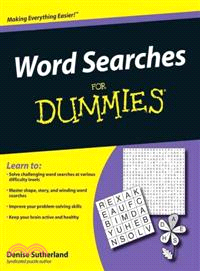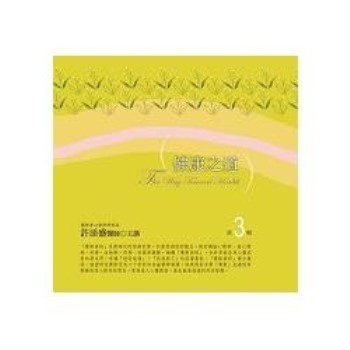| FindBook |
|
有 375 項符合
word searches的圖書,這是第 32 頁 |
 |
$ 471 | WORD SEARCHES FOR DUMMIES
作者:SUTHERLAND 出版社:JOHN WILEY & SONS,LTD 出版日期:2009-04-24 規格: / 432頁  看圖書介紹 看圖書介紹
|
 |
$ 682 | Simple Searches: 100 Large Print Simple Word Search Puzzles
作者:Bonaire 出版社:Textstream 出版日期:2009-02-26 語言:英文 規格:平裝 / 208頁 / 22.9 x 15.2 x 1.3 cm / 普通級 |
 |
$ 558 | The Everything Giant Book of Word Searches: Over 300 Puzzles To Challenge Even the Most Diehard Word Search Fan
出版日期:2008-06-01 |
|
|
- 圖書簡介
A travel-friendly puzzle-packed book that keeps the brain in shape
One of the best ways to exercise the mind is through word and logic games like word searches and Sudoku. Studies have shown that doing word searches frequently can help prevent diseases like Alzheimer's and dementia. Word Searches For Dummies is a great way to strengthen the mind and keep the brain active plus, it's just plain fun! This unique guide features several different types of word searches that take readers beyond simply circling the answer: secret shape word searches, story word searches, listless word searches, winding words, quiz word searches, and more. It provides a large number of puzzles at different levels that will both test and exercise the mind while keeping the reader entertained for hours. - 作者簡介
Denise Sutherland is a syndicated Australian puzzle author. Her crosswords, word searches, and other puzzles appear in a wide range of Australian and international publications, and she has written five themed puzzle books. Sutherland runs her own graphic design business, Sutherland Studios, where she concentrates on creating handcrafted puzzles.
- 目次
Introduction.
About This Book.
Conventions Used in This Book.
What You’re Not to Read.
Foolish Assumptions.
How This Book Is Organized.
Part I: Working with Word Searches.
Part II: Starting with Straightforward Puzzles.
Part III: Moving On to Complex Puzzles.
Part IV: Hints and Answers.
Part V: The Part of Tens.
Icons Used in This Book.
Where to Go from Here.
Part I: Working with Word Searches.
Chapter 1: Hunting through the World of Word Searches.
Word Searches at a Glance.
Using Word Searches to Keep Your Mind Sharp.
Understanding dementia.
Considering the importance of mind puzzles and games.
A Fun Romp through Word Search History.
Chapter 2: Perfecting Your Puzzle-Solving Strategies.
Solving Word Searches.
Gathering your equipment.
Marking the words.
Tackling the grid.
Moving Past Word Searches: Anagrams and Other Word Games.
Understanding anagrams.
Anagramming tricks.
Rearranging letters for tile games.
Baffl ing letter squares.
Staying alive in Hangman.
Part II: Starting with Straightforward Puzzles.
Chapter 3: Trying Your Hand at Simple Word Searches.
Chapter 4: Reading up on Story Word Searches.
Chapter 5: Finding Hidden Words in Your Puzzles.
Chapter 6: Solving Secret Shapes.
Part III: Moving On to Complex Puzzles.
Chapter 7: Gathering Your Wits for Scrambled Searches.
Chapter 8: Are You Ready for Some Quiz Words?
Taking the Quiz.
Turning to the Grid.
Chapter 9: Solving Secret List Word Searches.
Chapter 10: Weaving Your Way through Winder Words.
Chapter 11: Discovering Anagrams and Other Word Games.
Part IV: Hints and Answers.
Chapter 12: Helpful Hints to Keep You Going.
Understanding the Grid Coordinate System.
Chapter 1 Hint.
Chapter 3 Hints.
Chapter 4 Hints.
Chapter 5 Hints.
Chapter 6 Hints.
Chapter 7 Hints.
Chapter 8 Hints.
Chapter 9 Hints.
Chapter 10 Hints.
Chapter 11 Hints.
Chapter 13: The Answers You Seek.
Part V: The Part of Tens.
Chapter 14: Ten Letter-Pattern Tips.
Letters by Frequency.
Common First Letters.
Common Last Letters.
Follow Me: Common Letter Sequences.
Two’s Company: Digraphs.
Make That Three: Trigraphs.
Double the Fun: Double Letters.
Common Prefixes.
Common Suffixes.
Common Consonant Patterns at the Beginnings of Words.
Chapter 15: Ten Benefi ts of Doing Word Searches.
They’re Portable Boredom-Busters.
They Keep Your Brain Active.
They Increase Your Vocabulary.
They Help You Learn New Languages.
They Help You Gather Knowledge in a Way that Makes Sense to You.
They Let You Relax and Have Fun.
They Sharpen Your Spelling Skills.
They Train Your Brain to Recognize Patterns.
They Help You Overcome Insomnia.
They’re a Way to Spend Quality Time with the Family.
Chapter 16: Ten Steps to Help You Design Your Own Word Search.
Step 1: Choose a Theme.
Step 2: Gather Your Words.
Step 3: Make the Big Grid Decisions.
Step 4: Assemble the Tools of the Trade.
Step 5: Just Add Words.
Step 6: Ponder the Punctuation.
Step 7: Erase and Change as Needed.
Step 8: Fill in the Grid.
Step 9: Check and Recheck the Puzzle.
Step 10: Make It Pretty.
Using a computer.
Writing it out by hand.
|










